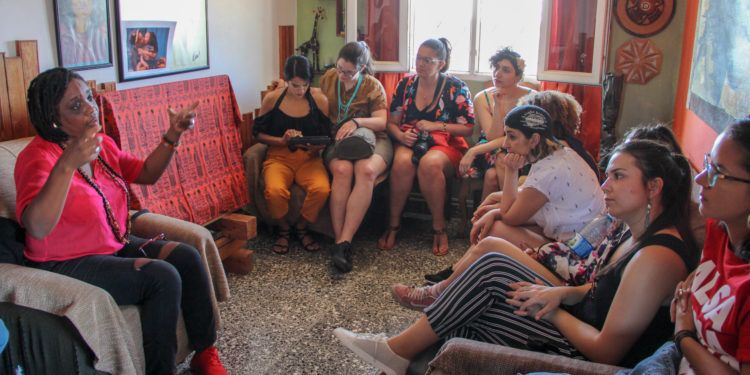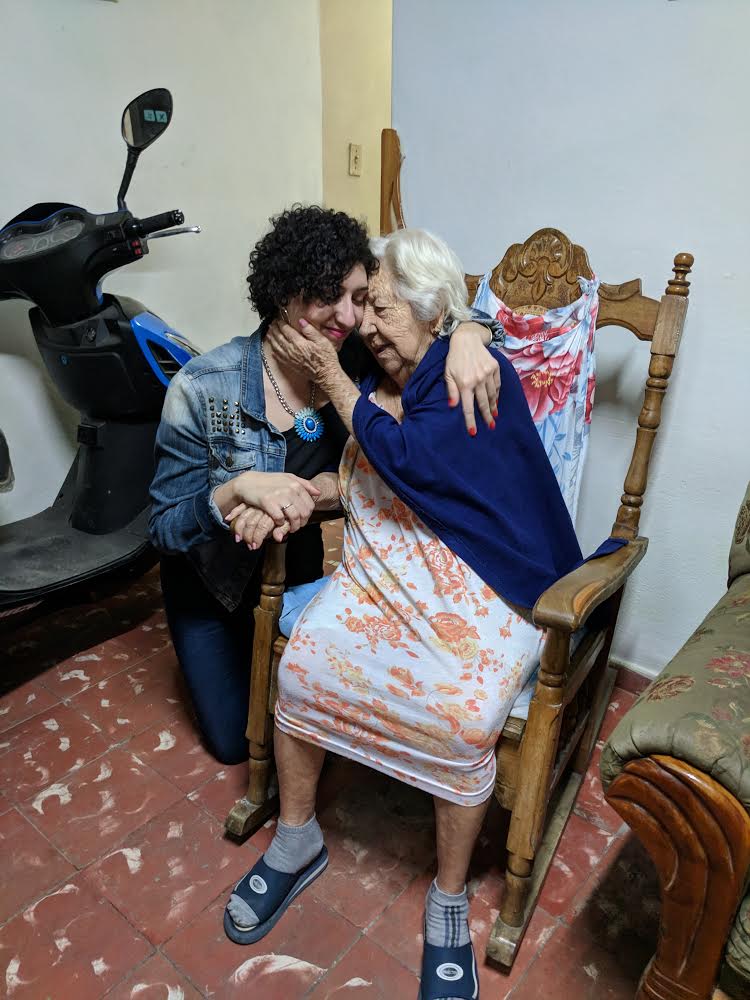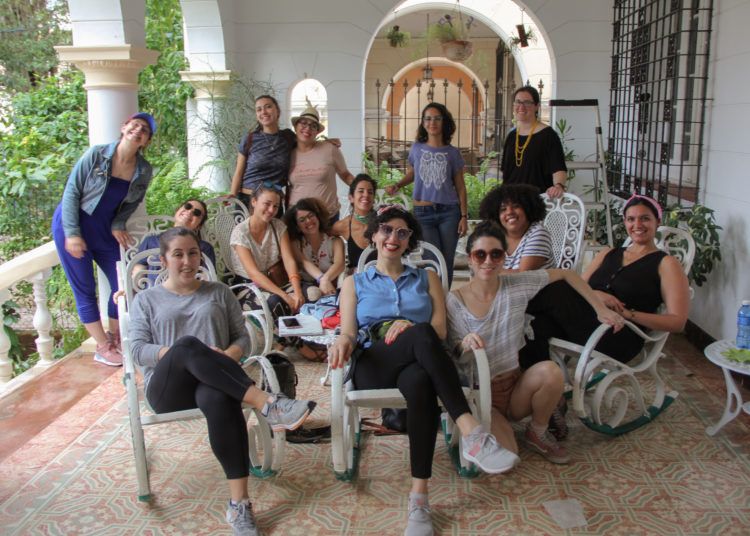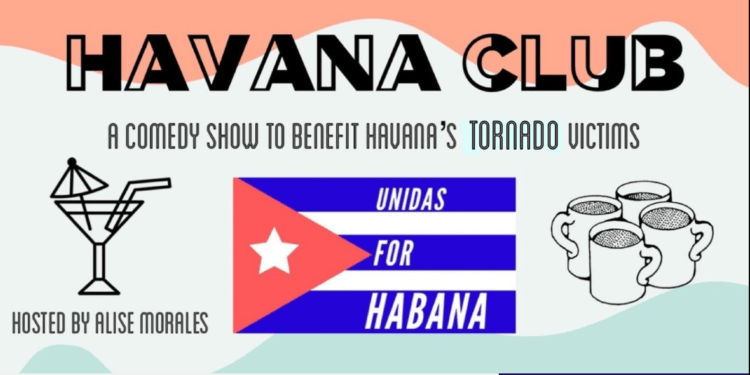Alise Morales, a Cuban-American actress and producer, gave the final touches to a charity show she offered last night in New York on behalf of the tornado victims in Havana.
Just a few days before a tornado suddenly struck the Cuban capital, Morales, along with a group of 10 Cuban-American women, had met with hip-hop singer Magia López at her house in Regla, one of the places affected by the phenomenon.
There they talked about society, racialization and gender in Cuba, in one of the meetings they had with Cuban entrepreneurs, artists, journalists and academicians during the Unidas trip, organized by the non-profit CubaOne Foundation.
In addition to Morales, after returning to the United States another of the participants started a Facebook campaign to collect donations for the victims, which will be delivered at the end of February in collaboration with the Cuban Caritas and other organizations.
In 2017 the foundation had also raised at least $75,000 to help the victims of Hurricane Irma.
On this occasion, the chance to give something back to the Cubans came quickly, but both Morales and the others hope it is not the only way to remain connected with Cuba. Morales even made a podcast where she talked about the trip’s impact on her.
Since its founding, CubaOne has been taking second or third generation Cubans to reencounter their roots on the island.
After those trips, collaboration projects have emerged such as a foundation to promote skating in Cuba.
This time the trip included only women.
Ellie Kaufman (producer at CNN) and LeAnne Russell (filmmaker) have participated in previous CubaOne trips, focused on Cuban literature. They were the leaders for this trip that showed life on the island through a female vision.
For Cherie Cancio, one of the founders of CubaOne, “We sought to work together with Cuban women on the island in global solidarity, discovering ways to understand each other better and collaborate to bring peace and unity to the divisions in our community.”
“Our hope for our first women-focused trip was to start a dialogue among women at the top of their respective fields on both sides of the Florida Straits, in order to foster cross-cultural dialogue and partnerships,” Cancio told OnCuba.
She added that this would be a first step to develop these relations and create bridges of reconciliation and projects based on shared interests.

A trip that changes lives
“The trip was an experience of a lifetime, as cliché as that may sound,” Alexandra Triana, events director of the Dacha Lof space in Washington DC, and one of the 10 members of the trip said to OnCuba.
“What impacted me the most was the feeling of belonging in Cuba and to Cuba. I feel like there has been a fire ignited in my soul and I can’t wait to see where it takes me,” she said.
During the trip they met with artist Esterio Segura at his home and talked with designer Leila Chaban, from Wasasa Bug Bag, Lauren Fajardo, from Dador Havana, and Yamilé Pardo, from AltaMira Art.
They also held meetings with plastic artist Mabel Poblet and with Idania del Río, founder of Clandestinas, one of the most internationally recognized Cuban ventures.
“When we were sitting in Dador, listening to a group of female entrepreneurs, I thought to myself: ‘Wow, this panel discussion could literally take place in my space for events in Washington DC.’ Yes, of course some of their struggles are different, for example, Wasasa Bug was closed on some internet platforms because it was selling from Cuba,” Triana explained.
“But, the challenges faced in gaining the respect of the neighborhood opening a store as a group of women, juggling being a mom and growing a business, those are a common thread of challenges women professionals face everywhere,” said Triana.
“Yes there will be a greater level of collaboration. I have already been in contact with many of the women I met. I have several ideas for how we can continue the conversation and cross collaboration in my city of Washington DC and Havana,” she said.
For Morales, the trip allowed her to experience the meeting of her groupmates with relatives in Cuba, although she herself does not have any. What moved her was finding the house of her parents and grandparents, being able to photograph it and that the current owners invited her to come in.

“To actually meet someone who was a friend of my Nana and Tio Juan, both of whom recently passed away, was beyond what I had ever thought would happen on my trip. I would have considered myself lucky to have just found the house and snapped some photos, but meeting her and speaking with the family who lives there made me feel truly blessed,” said Morales.
Morales confessed that she felt ashamed about the preconceptions she had of Cuba before visiting it.
“Coming from the States, I’m embarrassed to say I didn’t realize Cuba even had professionals, so the first hurdle was just throwing all my preconceived notions about business and work in Cuba out the window,” she said.
“The women of Dador really made a huge impression on me just because they reminded me so much of my friends here, just with more hoops to jump through to get their business off the ground,” she added.
“Hearing them talk about their art, their store, their hopes and their dreams sounded so much like conversations I have with friends here in New York and I’d really love to find ways to amplify their work and connect them with friends of mine here who would absolutely be interested in what they’re doing,” Morales said.
Like many second generation Cubans, another of her internal struggles during the trip was how to sincerely tell her family about her experience on her return to the United States.
“The biggest challenge since coming back from Cuba has been squaring my family’s history with what I saw, and trying to figure out my own relationship with Cuba that is separate from the rest of my family while also remembering our history and keeping in mind everything my grandparents sacrificed to come to the United States.”
For Triana, the return meant even crying on the shoulder of an unknown old woman, because of the feelings she experienced during the intense program.
“That short plane ride back is always emotional, but as Estereo Segura said regarding his work Cuba Goodbye My Love: Every second around the world there’s people saying goodbye to things, to people. Saying goodbye is not the end, it’s the beginning of bridges to things. The plane is a bridge. And, this is just the beginning,” said Triana.











